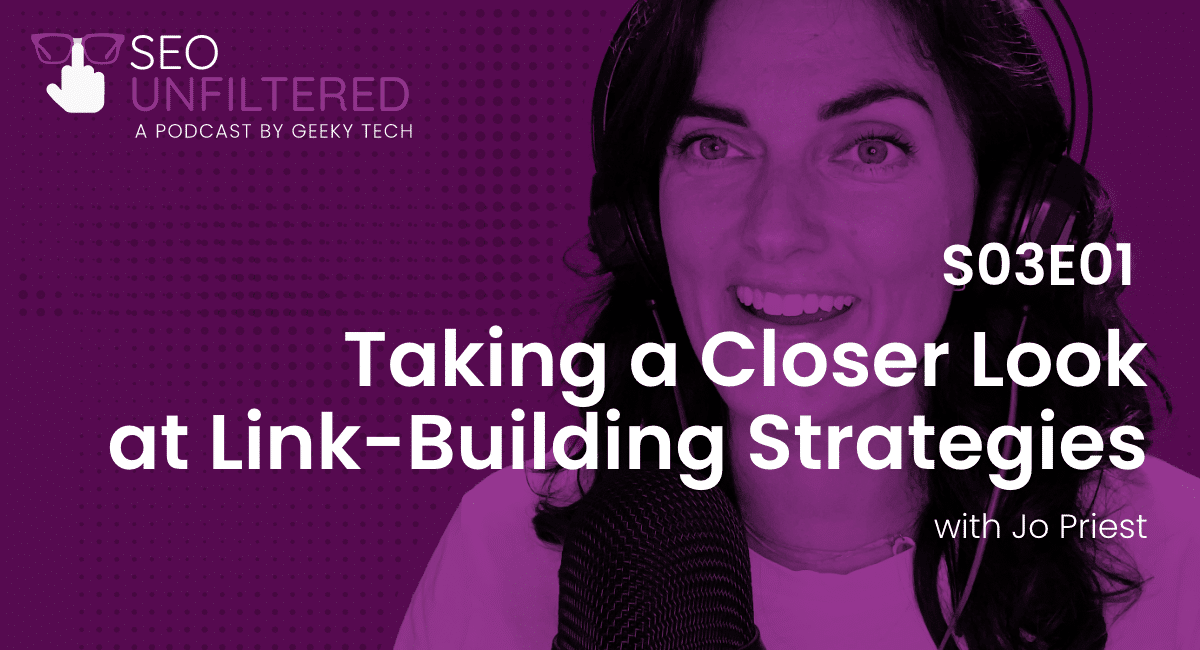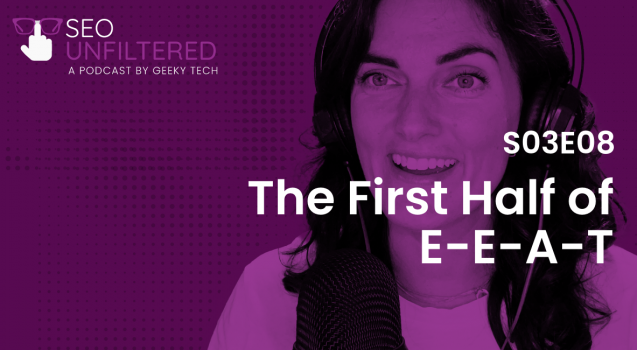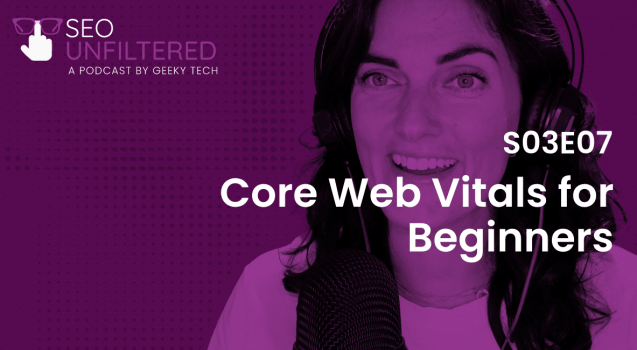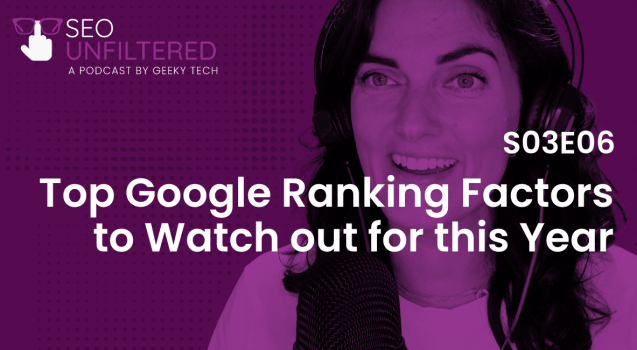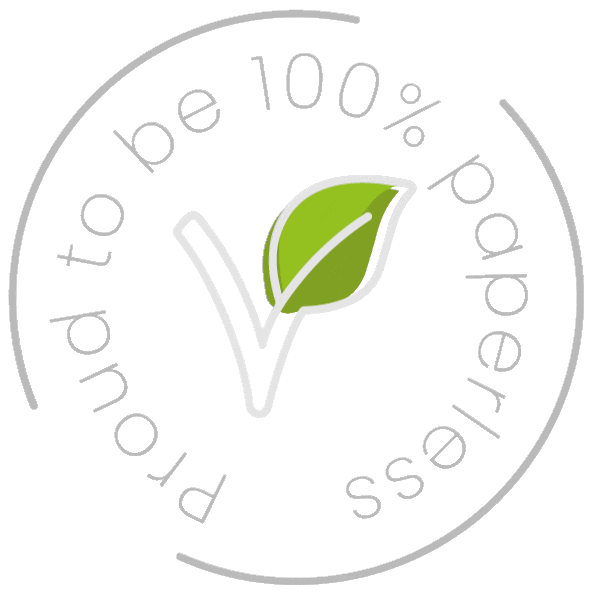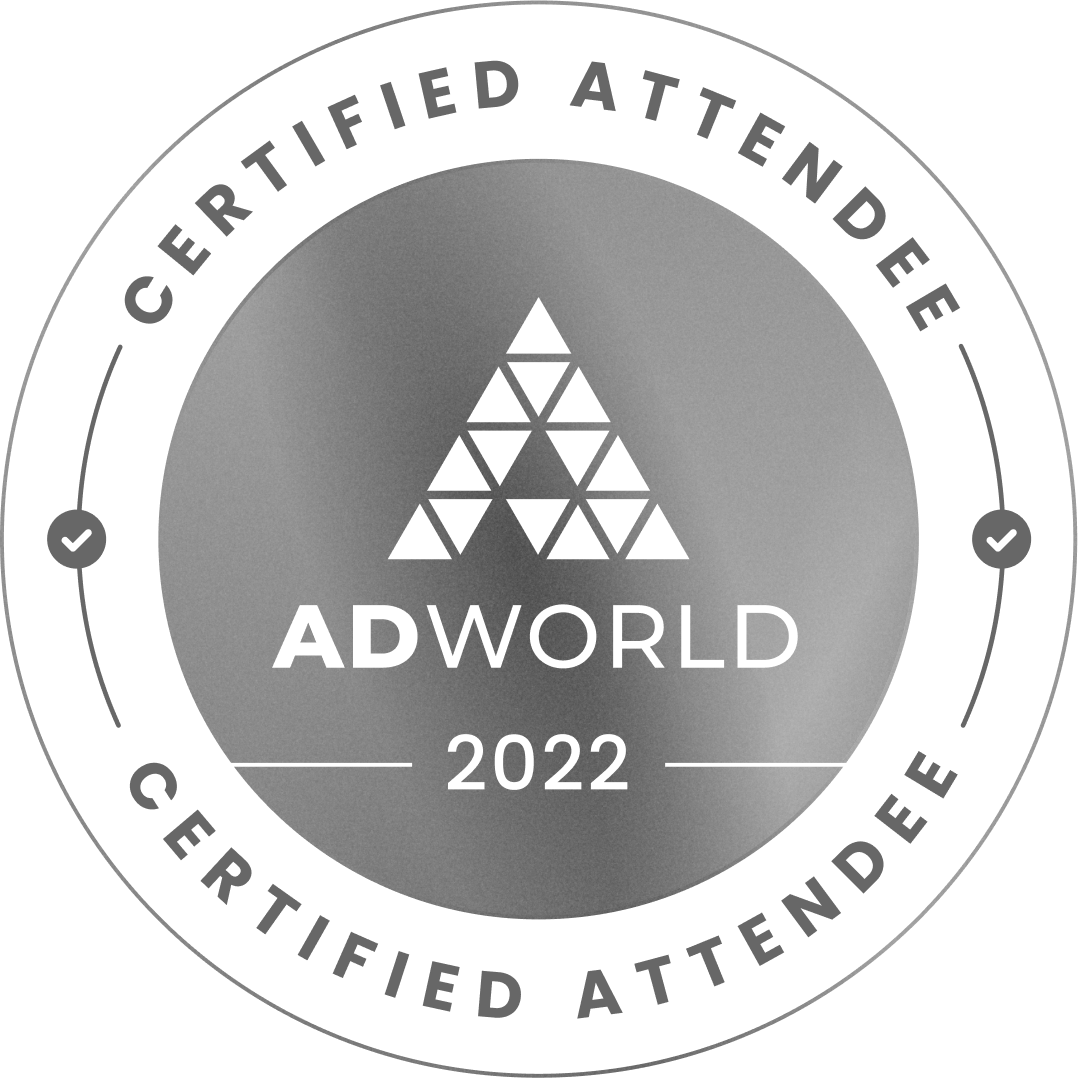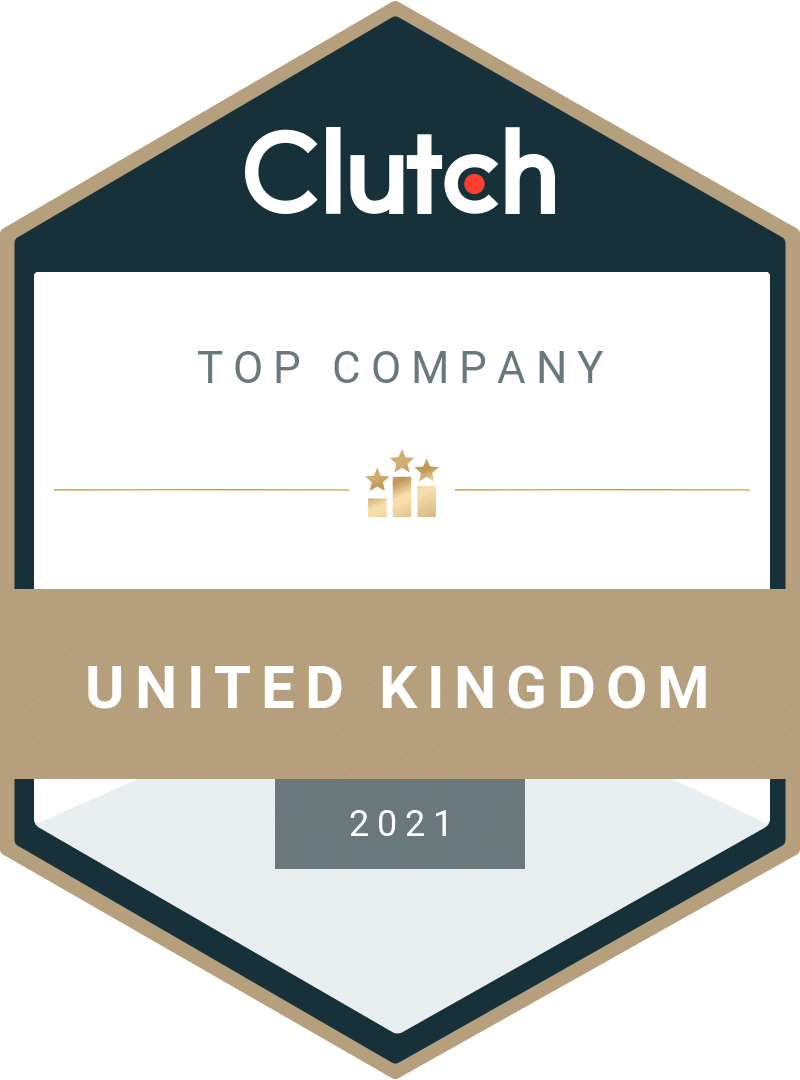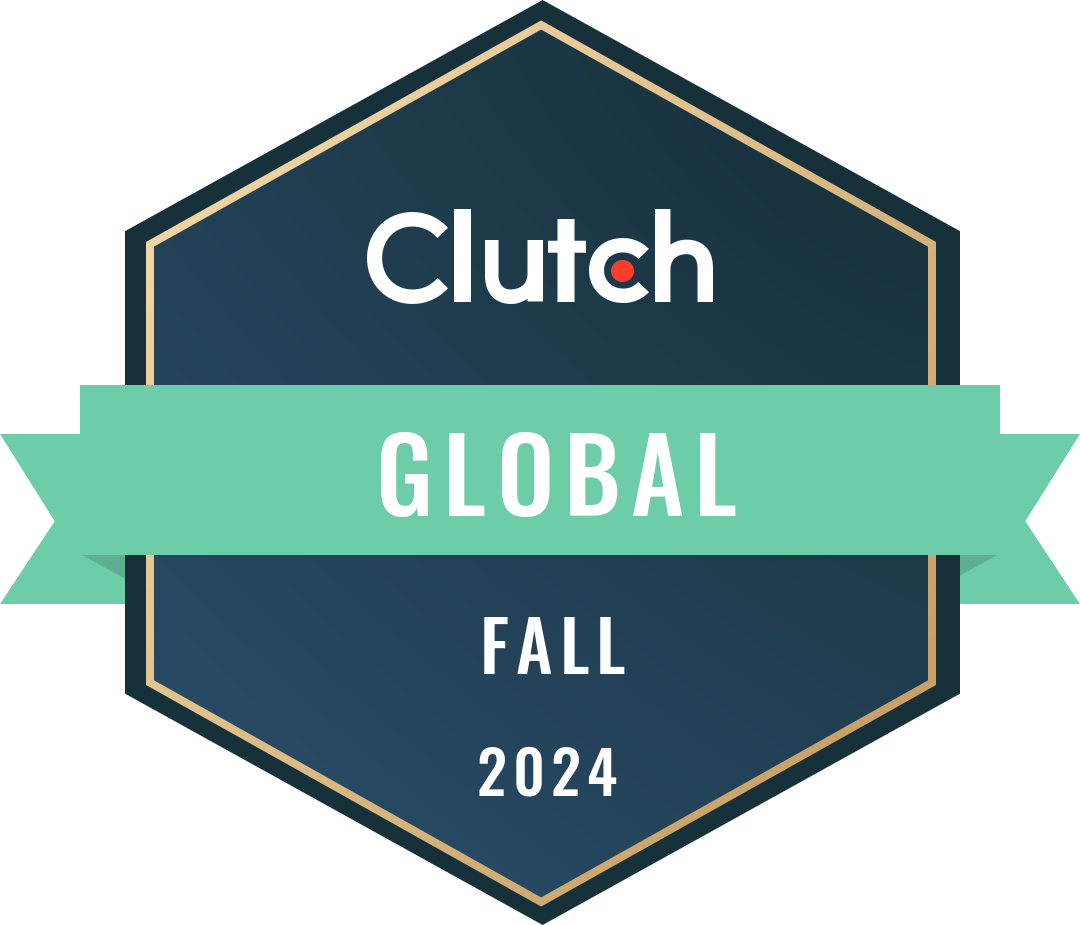Transcript
Genny: Good morning, afternoon, evening, marketing geeks. It’s been quite a while since I’ve made your ears bleed, and I’ve missed you all. Last season, we shifted our focus slightly from general marketing and SEO advice to AI and chat GPT related topics, and even though we only recorded those episodes a few months ago, so much of that information has aged as gracefully as skim milk left out on a hot day.
So, if you decide to go back and listen to those episodes, please bear that in mind. As tech geeks, we’ve been kind of stuck on the topic of AI for quite some time because it’s probably the most interesting thing that’s happened to the digital world since we switched to fiber optic. Just kidding. But today, as we step back into the recording studio, I want to return to a subject more closely linked to our roots, and that is off page SEO.
And yes, this recording studio does come with one snoring Labrador, so I apologize if you hear those sweet melodies in the background. Our team uses several off-page techniques to boost our clients online presence and credibility, and not that I’m being totally biased or anything, but we actually know what we’re doing.
As a subject matter, on the other hand, I find it quite difficult to talk about. What I mean by that is we can tell you what off page SEO is in a single sentence. We can explain that it basically encompasses every off-page effort to create backlinks and boost your domain authority. For example, a Forbes mention of your CEO in an article is bound to give you what we call good backlink juice.
Forbes, a trusted, well established, well respected, and certainly highly ranked site, would definitely boost your own site’s rankings with a mention. It’s not what off page SEO is that’s tricky to discuss, it’s how to achieve it that’s a bit of a head scratcher. After all, Forbes. com. Forbes mentions don’t just fall from the sky, you know, big brands like Forbes, USA Today, Business Weekly, and all those other tough guys have their own reputations to uphold.
So, they’re not going to champion or talk about just any company, they have to find you first. And if you don’t really have an off-page SEO strategy, or some sort of strategic partnership with them, your company probably isn’t on their radar. It’s a simple fact that off page SEO comes from sites that aren’t yours.
So then, how do you work on your off-page SEO if you have no control over who says what about your company? Moreover, how do SEO marketing agencies sell off page SEO as a service if they too have no say in what other high authority sites publish?
You might be thinking, “Now, hang on a second. Can’t you just pay other high-ranking sites for a link? Our team would be willing to fork out a few Gs for some decent mentions. Why can’t we do that?”
You might also be wondering, “Can’t you just buy a bunch of other sites and use those just to constantly churn out content that links to your main site?”
The answer to both is yes, I guess you can do that. And to be fair, a lot of sites do do that.
But you technically shouldn’t. You see, buying links and building link farms, which is what the latter scheme is called, is against Google’s code of ethics. It’s not against the law, mind you, but if you’re the biggest search engine in the world and you say companies can’t do something, It may as well be written in stone.
There are many off-page SEO strategies out there that cross into unethical or black hat territory. But in a nutshell, if you’re manipulating your way into getting more links, whether that’s through link buying, content spamming, or link farming, then you’re probably going to SEO hell. Just kidding. But you’re technically in blackhat territory.
Let’s take a second to understand why Google deems these practices so unethical. And I think this is probably the best time to point out that when I’m talking about ethics, I don’t mean ethics with a capital E. I mean against Google’s code of ethics. So, let’s look at this. The point of off-page SEO is to demonstrate your site’s authority and credibility.
According to the gospel of Google then, these two things must be earned and not paid for. Which makes sense, right? You don’t want someone to recommend a doctor if there’s a chance that the doctor bribed your friend for the recommendation, would you?
You’d be wondering, why does that doctor need to bribe someone? Can’t they get recommendations based on the quality of their medical practice alone? And would my friend really recommend them if they weren’t being paid to do it? What do they really think of this doctor? And should I maybe avoid the clinic that the doctor works from altogether? If this type of shady behavior is allowed, should I even bother wasting my time finding out if this doctor is legit when there are so many other doctors out there who already have hundreds of real testimonials from real patients?
That analogy right there is actually why Google has built an ethical framework around link building and why going down the route of buying backlinks is a tricky one, one that sometimes doesn’t actually yield long term results.
Either Google will punish you for it or you’ll spend a ton of money on links from spammy sites that have such low authority that you won’t actually be doing your site any favors or Google will just completely dismiss those links altogether, therefore wasting your time and money.
And just in case you’re thinking, “Wow, wow, Google must really care about people if it’s going through all that trouble to make sure that the top-ranking sites are legit ones.” Please bear in mind that Google is a multibillion-dollar company that doesn’t necessarily care for your well-being as it does for your wallet. Not to sound super pessimistic or anything.
Its backlink standard is purely economically driven, since it relies on your continued patronage to make money, and just as you would steer clear of that medical clinic, you’d probably switch over to Bing or another search engine if you suspected it was being shady. Anyway, off page SEO is a tricky topic and a trickier service to sell because as a legitimate SEO agency, we always have to be mindful about how we talk about off page SEO, how we sell it, and what we’re actually doing to boost it.
We can’t buy your links or build link farms, but we can and do devise strategies to build your site authority as promised. If you really look at it though, is developing a backlink strategy any different from backlink manipulation? How does Google decide what is a strategy and what is manipulation? Does it even care? How does it differentiate between links earned and links paid for?
Here to talk about off page SEO and hopefully help us separate in our minds the difference between black hat and white hat and gray hat. SEO tactics is Joe Priest, the keeper of all AI knowledge, but also Geeky Tech’s own off page SEO specialist.
Now, I just want to point out that I recorded the interview with Joe before I recorded this introduction, and it’s really interesting to hear what he had to say about paying for backlinks. His explanation is quite eye-opening and logical, and I just found that he cut through the bullshit of it all, so please enjoy this interview because you might just learn a thing or two about off page SEO.
I mean, I certainly did.
So Joe, just to get us started on the right foot, I want the marketing managers listening to know what’s at stake here, why we’re even talking about off-page SEO in the first place. So, can you explain why off-page SEO is so important as a strategy?
[00:06:29]Jo: So, one of the things that Google look for in ranking is kind of the citations or the mentions of your page elsewhere.
So going back to, uh, originally what made Google a different search engine or what made Google a better search engine was a thing called PageRank, which is basically based around links. So, if you typed in dog training, then it would just look at a page, see if it mentioned dogs or training or dogs training, and then come up with all the pages that had those words on it, and then it would rank them in their different ways.
And then as those algorithms built up, they would have, “okay, does it mention dog training in titles? Or does it mention dog training in H2s?” And that’s still part of, um, different algorithms and, and how, how it’d be looking like. But yeah, when Google came along, they came along with a thing called PageRank, which looked at things slightly differently.
So, one of the things is obviously, they looked at those things on the page. But the big thing was, is that they looked at, um, citations or mentions of this page or webpage on different websites. Um, and then they came up with their own calculation to be able to rank those pages.
So if one page about dogs was mentioned by six other pages about dogs, they know that’s been linked to is a relevant page about dogs. Okay, so not only are they trusting what’s on the page itself, but they’re trusting what other people are saying about the page, but then it’s basically how they thought how do you trust a source?
The same as a paper: where do you get your evidence from? Right. And so, they use kind of citations. So if paper A, paper B, or book C uh, B and C mentioned this one, um, page all about dogs, then you could, there’s a high probability that this page is, is an authority on dogs. And so that, that is the, that’s what differed, uh, differentiated themselves from, um, other search engines way back in when in 95, well, you know, 20 years ago, 30 years ago now.
Um, and obviously they built on that, um, and they’ve slightly moved away from it. Um, but that was the original, um, differentiating point. And that was all based on links. So, I don’t know if you’re old, old school, then way before that, you could get away with stuffing keywords on your page and, um, doing that.
And then they brought out this kind of, um, uh, yeah, citations. And of course, it’s kind of a battle between SEOs and, and, uh, algorithms and, uh, you know, search algorithms, how do you manipulate them? Um, and so people have been, uh, battling this part of the algorithm for a long time.
[00:09:39]Genny: So, it’s really, like, the battle is really just to prove that you’re more of an authority than other sites?
[00:09:48]Jo: Yeah. So you’ve got your kind of on page where you give out the correct information for the search term and you’re being, um, you’re proving that, okay, you know what you’re talking about. Um, so you can, you can tell the world, you yourself can tell the world that, you know, everything about a certain subject and that you’re the authority on it, but for credibility, you need other people.
Yeah. Okay. Um, and again, over time it’s evolved to not only those people saying is it, they can layer it up, uh, kind of put layers on it. Now they’ve got kind of authors and they’re following authors, and they can show who authored a piece and what other, where, where, where else did these authors, um, yeah.
[00:10:32]Genny: Have they added layers onto it because it’s become, um, much more competitive and people have figured out ways to manipulate it?
[00:10:41]Jo: Yeah. So, uh, I don’t know if you heard of penalties and there’s, you know, there’s, there used to be a lot of, um, talk around penalties, I don’t know, maybe five years ago, you know, when the panda, a panda and penguin came out.
So people work out. Um, what affects the algorithm and again, that’s what SEO is. SEO is know that, okay, if you use the keyword in certain places and if you use, um, words around the topic, then it will be considered. And the same with backlinks. So if you use, um, backlinks with, um, certain titles or get them from certain, certain places or, um, get them, get the number of them up.
So instead of just having one or two, uh, uh, links, then you get suddenly get a thousand links. And there’s also velocity. It’s like, okay, how far should you get those links? Can I just add, you know, uh, a hundred links in a day and then be done with it? Or, you know, can I And this is getting to spammy. Can I spam the internet with like a million links to a certain page and would that work?
Um, and certain, you know, at certain times that’s all worked. Um, and as it worked, um, obviously it gets out into the kind of, uh, SEO world and then Google sometimes closes that loophole. Okay. Um, and that’s when you’ll see kind of penalties coming in.
[00:11:56]Genny: This whole thing that I’m, that I’ve been exploring is this whole idea of ethical link building. Can you explain more why Google wants to reinforce this?
[00:12:09]Jo: It really depends on the ethics, the ethical part of it. Google want to sort out the internet, um, without any help from anyone. So they obviously believe in their algorithm. They don’t want people trying to manipulate it. Yeah, okay. And so in their guidelines, so in their guidelines, they don’t want to have any link building.
Um, or any, nobody, um, going out there to intentionally build links to kind of persuade their algorithm to do something because it’s kind of like this trust thing. They think that if you put up a, um, an extraordinary piece of content, people will naturally find it and then naturally. Um, link, link to it, but then you got a billion pages a day being made.
So, so, but that’s what they’re trying to concentrate it. They think that if you build the best piece of content, people will naturally find it. Um, uh, and people will link to it. And in some cases that, that, that might be the case. Like if you built a great piece of content and you already have a follow up.
of people, say on social media or Twitter or, uh, you know, formerly Twitter. So, um, then, you know, you can put the word out that you’ve got, um, this, right at this great, great bit of content and you’ve got people coming over to view it. And then some of those will actually, uh, link back to it and, and you can build, uh, I presume that’s what they would think ethical link building is.
Um, and then you can go the other way, obviously any other, other link apart from that. So, if you intentionally build a link for the purposes of ranking, then you are breaking Google’s terms of service. Wow, that’s so strict. But it’s not illegal or anything. Um, you can’t, you’re not going to get locked up for building links.
Um, so the ethical part of link building, the ethical is, is Is it ethical to break someone’s terms of, you know, their conditions on purpose? Or are you really talking about ethical? Should I be, um, breaking into people’s websites so that I can put a link on it? Um, you know, and actually breaking the law by…
kind of hacking into websites. So there’s, there’s kind of, the ethics there are slightly different.
[00:14:23]Genny: Yeah, okay, I understand. That, the second one you were talking about sounds really shady. Does that happen often?
[00:14:32]Jo: Uh, yeah, but, you know, I, I think the terms white hat, black hat, and grey hat are probably thrown around.
Um, and people’s ideas of kind of black hat, you know, I, I would think that most white hat SEOs are actually in Google’s eyes—
[00:14:47]Genny: Grey? Oh, really? Black?
[00:14:50]Jo: Well, it depends on how you go, like, you know, if you’re, if you’re intentionally going out to build links, then according to Google, then, you know, you’re a black cat.
But, um, that’s such a tricky, but you know, but in my eyes, you know, being a black cat is, is. you know, maliciously, um, breaking the law but breaking into websites or having links on places that you know you shouldn’t have links and that you haven’t kind of earned.
[00:15:16]Genny: Yeah, that’s what I’m, that’s kind of where I’m coming from too is, um, kind of doing it in an unfair way or even more so paying for it rather than earning it.
Um, but do most people pay for backlinks or what’s the deal with paying for backlinks?
[00:15:34]Jo: So I would say the mid, I don’t have numbers, so, but in my experience, most people will be paying for backlinks. Um, just because if you do any sort of outreach to legitimate websites, a lot of people will come back with a price.
Because now that backlinks have a value, people want to get paid that value now. So you could have a really good website about dog training, um, and you’ve been working hard on it for three, four years, and you’ve got all of this traffic coming to your website, and you’re, you’re the authority, um, and then you get a request come in for a backlink from one, from your site to another site.
I mean, should you do that for free? Or does that suddenly give your website a value, even just a link? And so with that. the values associated, and so you’ll start asking for a price.
[00:16:27]Genny: So, is that just not affiliate, affiliate marketing?
[00:16:30]Jo: No, so affiliate marketing is slightly different. If I reached out to you saying, oh, would you like to be an affiliate, um, I would be paying you for the traffic that you send me, um, and then the sales that you make, or the sales that you make, I make from your traffic.
[00:16:44]Genny: As opposed to just adding the link without, um, trying to sell the product.
[00:16:51]Jo: So, if I just reached you, reached out to you, say, Hey, I saw you got a great website on dogs. I’ve also got this great website on dogs. I think you’ll be a great match. Um, how about you link over to my website? Cause I’ve written this great, great, uh, article about, um, the puppy training and they go, okay, yeah, sure.
Um, I’m happy to give you the link. It’s going to cost you 120. And then they go, okay, great. Here’s 100, I’ll put a link on my website to yours.
[00:17:17]Genny: Okay, so for link building, you’re saying that everyone’s kind of doing it, because why not? There’s a value there. Um, and, but at the same time, Google, in Google’s eyes, it’s strictly verboten?
[00:17:31]Jo: Yeah, I think they, they say that. Um, and obviously they roll out penalties, and they try to, um, algorithmically, um, combat it. And then before they used to have, uh, um, manual penalties and they still do, um, for people, uh, for things that you can actually see, see it being going on. And there’s different ways to interpret how to get links.
As I said, the, the affiliate way is you sign up an affiliate program. Um, then suddenly you’ve got all these people linking to your site, um, which is one way. There was a scholarship building where, you know, I’ll put up a scholarship for a thousand pounds, um, to your university. And then suddenly all these people are linking back to you because you’ve got the scholarship.
And then obviously from that scholarship page, you then link out to wherever you want those links to go. So there’s different ways of thinking, and it’s kind of the SEO’s job to, um, think of ways to get around or think of ways for people to get to link to your website or legitimate ways to get to people without having to ask for the link.
So for example, probably one of the most recent ones are press releases and getting your name in the, in, in press releases, uh, by outreach. So there’s a couple of, um, uh, well, Harrow is probably the biggest one that’s been abused recently, um, which is help a reporter out. So. Basically, all the reporters, um, put their, uh, story online and say, okay, I need some experts to talk about this, this, if you’ve got that experience, then come back to me.
Um, and obviously, uh, we may or may not use your comments and we may or may not link back to your website, but people can just, uh, what’s the word, hammer that, say, yeah, I’m an expert at this, here’s this, here’s my comment, et cetera, et cetera. And again, you, you need to. And so all these people, and I’ve seen comments in like the BBC, it’s like just some random site from this random person that’s got nothing, nothing to do with anything.
Why really? Yeah. Because they, reporters kind of need, need stories and they need, um, sources. Um, but there is a, there is a, um. I suppose a more valuable one, which is, um, actual proper outreach to journalists where you have a story or you kind of piggyback off stories that are happening in the news. Um, you know, if you see a good story that you want to piggyback off, you can then, if you have a very large list of, um, journalists who are involved in that sort of category or area, um, then you can write a good piece about.
Whatever the story is or something related to it, um, and then outreach to them, uh, with your story and try and connect the two for them. So then they can write a story about this and then they can connect you with that and they generally would leave a, uh, a link, um, to your site. So that happened. So that, that, you know, I would call that legitimate, um, kind of PR outreach.
That sounds like a lot of work. But it’s the same as, it’s the same as outreach for just a general backlink. So you would say, you would, instead of finding a nice website that you want to link on, um, and emailing them, you’ll find a journalist who is in the same, who writes about the same sort of thing for a website that, that you want to get on, and you would email them instead of emailing the website.
Um, and then you do a little bit more work for them because you’ve, you’ve, you’ve joined the dots between the, the, the current news story and what your website does. So you kind of connect the dot, those two dots.
[00:21:03]Genny: Okay. Well, I mean, I can’t imagine we would try to explain that in like a sales call to a customer. Obviously there are, um, SEO agencies like us that offer off page SEO as like a fundamental, a fundamental aspect of the service. Even though it might not necessarily be. specialize like you were talking about?
[00:21:28]Jo: Yeah, there are, um, again, because everything has a value, um, people want backlinks. And then, um, when you actually do route outreach, um, you then find the people that are amicable, um, or, you know, uh, happy to be adding backlinks to their website.
And so over, over time, you build up your own list of people. Who, you know, that will help you out for probably for a cost. Yeah. And so then when you get another client on board and they need a link to somewhere, you’re probably not going to go, well, you, you probably will go through some of the outreach, but you would go through the outreach, but you would hit your list first, you know, because you know, you’re going to be able to a hundred percent get those links on those websites for a, for a cost.
And then if you want to go more niche specific, then you would be doing the outreach. Yeah. And then that outreach can be different things. I mean. Yeah. Um, some of them would be kind of guest posts. Some of them would just be mentions or some of them would be, um, editing old articles, uh, just to include their link in there.
Oh, you can do that? Yeah, uh, it’s easy. Like if you find a really good page on the internet that’s getting a lot of traffic and it’s got no links, you can reach out to that website and say, hey, I saw you got this article up. Um, maybe you can slip in a, a link to my website. For a fiver? Yeah, for a fiver. And they’ll go, no, that’s got a lot of traffic on it, um, that’ll be 500, please.
[00:22:52]Genny: Is it at all avoidable, or is it always something we have to pay for?
[00:22:56]Jo: Um, no, it is, obviously it is avoidable if, again, if you have an audience, um, and, or a website that has already got that credibility. So, if you’re a big site. Um, a large site, you will stop building links eventually, you have to get there first.
Yeah, well, you do like if you’re a small site, you’re just starting off, or you got no, um, no audience, then you do have to get backlinks. And you’ve got to get them from somewhere. If you’re a large site, then the chances are that you’ll have links coming into you all the time, maybe not the kind of links that you want.
But you know, you’ll get directory listings and, you know, uh, different, um, more spammy kind of, um, uh, scraper sites linking to you, um, and all these links would just be constantly coming in. Okay. You’ll reach a, uh, a point where you don’t need to build links. Okay. But for, for small sites, you know, you’ve got to start off with.
You’ve got to start somewhere. So obviously you, you know, you make sure that you’ve got all your social profiles all done, even if it’s just for, um, brand protection, but you know, all those links on, on Facebook or, um, LinkedIn, they, they will count, they will get picked up. And then, you know, you want to, depending on what your business does, you want to get, you want to be seen as a real, real business.
So, you might get some business, uh, directories, you know, something that is associated with your industry. So, if you work in cyber security, then there’ll be a lot of. Um, cybersecurity, uh, qualifications and certifications that, that you want to have and you want to have your website, um, on, um, so you probably want to go out and, and fill out all of those forms, um, to get your, get your company listed on, on those kinds of sites.
Yeah. Yeah. Yeah. Um, so, so already there, you’ve probably got a hundred, 150, uh, links to your website. starting point. Okay. And then you’ve got a kind of SEO press releases where you’ve got a bit of news, and you want to get it around the internet. Um, you know, that will set you off with another 400, 500 links.
So again, it’s, it’s kind of, if you’re building a business first, the thing, the first thing you do is build your, um, or protect your brand. Um, and then you get the news out that you are open for business and then you would see that you’re posting regularly on, on other places, getting your author, you’re then kind of, I suppose, not guest posting, but you’re, as an authority, you are being asked by other people to post content on their website.
So again, something, yeah, something that’s been abused, but you’ll see guest posting, um, opportunities everywhere.
[00:25:26]Genny: Okay. So, if you’re looking at Uh, if you’re comparing the quality of links, what’s better a high volume of low to medium quality links or a low volume of medium to high quality
[00:25:37]Jo: links? Um, I think it depends on the, uh, kind of site that you have and how big it is.
Back in, back in the day, Google took notice of the anchor text. So, the, the text that is, um, uh, used as a marker for your, for the link. So, um, if I was to use. Quake training as a term. Instead of having my whole URL there, I’ll just have, um, Quake training. And then if you clicked on those couple of ways, it will take you over to the, to the website.
And people worked out that if you use anchor text that you like specifically, so if you want to, you want to rank for Quake training, then you would just constantly use Quake training in every single link that you had, or, you know, a high volume of them. then you would rank for that term. Makes sense. And so, Google had to combat that, and they built a, a, a, kind of a, part of the algorithm that looked at that, and then penalized people who did that on purpose.
But then it came out that actually, if you, if you use a good proportion of exact match, and then they also look at, um, the content around it. So I’m guessing around about 16 words on either side, but that’s my guess, um, you know. So precise. It’s about, 33, 32 words, but who knows. Yeah, so I’ve kind of looked at, looked at that.
So we know that, um, anchor text is Um, a thing that they had to combat and so that worked and it’s still, and it still works as a marker, um, for backlinks. So if you had, um, a hundred links with click here or, um, uh, read this, would they, would a lot of those be better than a single one that said create training?
So, and then how are you defining a quality link, um, is one that says click now on a very large website with a lot of. Um, quite authority. Is that better than one from a small site that is all about dog training, the page is about dog training, the section that, um, you’re talking about is about crate training, and then the anchor text that you’ve used is also crate training.
Would you say that was better? But it’s just a smaller site. But a smaller site. So, you know, I don’t know, what would you say? Well, but in an ideal world, you’ll get, um, you know, the biggest pet, um, pet website out there, um, in their dog section. Um, all about training dogs and then training puppies. Um, and then an article entitled how to quake train your, your puppy.
Um, and then an article about it. And then, um, you’d have some texts that say, Oh, if you want to learn more about quake training, then this, we found that quake training methods on this website, um, helps. And then if they then have a anchor text that says quake training, which leads to your site, that would be kind of the best link that you could get.
And then you can go one stage further down, uh, one stage down where maybe it’s not the biggest site, but it’s a low site, but it’s all about dog training. The article is about dog training. Um, the anchor text is about dog training. And then there’s a one lower than that, where the whole site is, is not about dogs.
Um, the article is not about dogs. Um, but there’s somewhere in that text that says. Quick training. And then you can go one lower where it’s just, uh, the site’s not about dogs, the article’s not about dogs, and the anchor text is just, click here. I mean, uh, would you want that link? Um, so high quality, I mean, um, if you’re, if you’re building links, um, with outreach and things like that, you would say a high quality link is one that would, um, that has a good chance of being clicked.
[00:29:20]Genny: I’m just trying to wrap my head around it because… In the example of the one where it just says click here, but it has nothing to do with crate training, it has nothing to do with dogs, it’s on a completely random website, but it says click here and it links to your site, wouldn’t that be a low authority site and therefore not really have um not really be worth the effort to reach out to this company to get that link because it’s not really going to move the needle in one way or another.
[00:29:50]Jo: If that link is on yellow pages, for example, then that’s probably worth having. Because they use it for different things.
[00:29:57]Genny: But what if it’s just like, what if, uh, you’re, uh, someone reaches out to you and they run like this crazy link farming scheme, and they’re like, oh we’ll give you a thousand links for a thousand pounds, and it’s just on this random, I don’t know, gambling site that somehow links to your crate training.
Page how is that not also we’re looking at quality of the site as well That’s that it’s linking from.
[00:30:22]Jo: I’d hope your common sense would kick in there.
[00:30:26]Genny: What do you mean? I mean if you’re paying just for a batch of links from a bunch of different sites like do you know what I mean?
[00:30:34]Jo: Yeah, I don’t—I really wouldn’t reach out or accept anything from a team that you don’t trust.
Okay. Um, I mean, if you get an email trying to send you links, um, I would either do your research into the company very much and again, do what Google do, see what other people are talking about. Um, look at their case studies. Yeah. To see exactly what they’ve been able to do for other people. Okay. I wouldn’t just say, oh that’s, that’s crazy, that’s a crazy good price, um, let me have more.
Uh, I think due diligence has to be in there, um, especially if it’s, if it’s, if it’s something like your, if it’s for a company, then you need to know, um, the people that you’re doing business with. And it is a business.
[00:31:21]Genny: What you’re saying is like all links aren’t created equal, like you shouldn’t, you shouldn’t Just because you can, you can get a link doesn’t mean you should from that site.
[00:31:29]Jo: No. And again, a lot of companies get emailed this, Oh, I have this website all about you. Um, it will only cost you a hundred dollars for this, but then you’ll, you’ll spend a hundred dollars on a single link. Yeah. And the chance of you seeing anything or seeing a huge movement from that single link is. Uh, slim, depending on how big your website is.
Right. Um, you’ll see, obviously you’ll probably see some movement, however, you won’t be able to attribute it to that link, so you don’t, you don’t really know whether it was that link or something else that’s happened to either the SERP or your website or something, someone’s changed something internally or someone’s put some internal links onto your website that changed your ranking for that, for that.
Google make it very difficult to, uh, attribute link. link power or link juice just because they don’t want people manipulating it. If they see a new link come in, then maybe, um, they might, uh, look at the two things and they say, okay, actually, we’re going to drop your page for two, three weeks and see what you do.
So, or we’ll randomly up it for a couple of weeks and then drop it. Um, or we’ll just keep it the same. For three weeks and then we’ll then give you the juice for it and then it will spark up there. So you, they, they, not randomize it, but they, you know, they, they try to hide the effect of links because of the days where people discovered it was linked.
So then people try to, you know, you know, reverse engineer it and say, okay, if I do 10 links to this website in two weeks, this happens. So people would just be doing 10 minutes, two weeks later it’ll go up. If I just do five links then, uh, you know, in two weeks it will just go up this much. So, uh, you want to hide that.
So Google had, was probably still, they’d still have their own kind of page rank score. Yeah. So they know what a site is, is worth or how many links or how in the whole. In their whole universe of, of, of things. They know how important a website is. Yeah. Um, and so if you get a, a link from an important website, you’ll receive more kind of, um, a, a good proportion, more, uh, links, uh, sorry, power from a website with a, however, since they check, you know, the algorithm has been changed since then.
[00:33:47]Genny: In terms of like a service we sell to B2B companies, our. ability to offer SEO, off-page SEO is boiled down to what?
[00:33:58]Jo: So, our SEO is kind of two ways. We know the fact that you need good quality pages um, and We need good quality pages and links to rank something. Yeah. So, we specialize in on page. So, making sure that you’ve picked the right keyword, um, that you’re on page is good.
And then for the off page, we make sure that Google sees that page. So, we do that via internal linking from your own website and we then do it off page. So we make sure that Google sees us talking about your page on different websites. So it’s not just you saying that you’re good. It’s, it’s other people saying that you’re good as well.
Yeah. Um, and we try to go with relevancy. So we build links that we try to be as relevant to the topic as possible. So if you’re talking about, uh, Quake training, we will be talking about, um, you know, uh, puppy treats for Quake training. Um, or, uh, you know, if you, so really on, kind of on topic. Okay. So that’s where we try and, um, specialize, you know, and then, um, going back to, um, the, the amount of links, um, those are kind of like the.
Um, I put this sniper out, sniper, sniper, sniper shots, you know, we get, make sure that the, the anchor text is, is very close to what you actually want to be ranking for. Um, making sure that Google knows it. We also make sure that your whole website. is seen by Google. It’s not just a little dot in a billion websites.
It’s other little dots all over the place pointing to yours. So we make sure that you, you’ve got your brands, brands sorted, that you’ve got news, your, your, your site is newsworthy and it’s getting picked up by news outlets. Um, and then they’re all pointing back to you as an authority, um, in your topic.
And then on the side of that, you’ve got little sites that are, that are also talking about, um, Uh, you talking about your topic, um, linking back to, uh, your page that we want to rank. Um, and that all backs up the, the good on page that we do.
[00:36:09]Genny: Okay. Oh, that makes sense. Okay. Well, thank you, Joe. I think, yeah, the only other question really, cause I think I’ve kind of.
all the other questions, but it was more about whether or not press releases are actually the kind of press releases we do are actually that, um, beneficial to a company’s SEO. Cause there’s a huge difference between press releases in general and like in the The general, um, definition of it and SEO, the SEO version of a press release.
[00:36:41]Jo: So yeah, yes, those types of press release help SEO. Um, uh, you can clearly see it, obviously more links, um, help the website. And so having that story, um, go out there and all these things coming back to your site will help your site, um, initially. But, but what we do know, and you’ll be able to see from your, um, uh, Google’s crawled, uh, links in, uh, from, uh, console is that they do get picked up.
So, um, what, one of the things we’d like to concentrate is actually what is Google seeing. All the tools like HRSSM, they all have all their large backlink lists, um, of, of what’s linking to your website. So that’s not necessarily what Google sees or Google counts. Um, you know, uh, that’s what HRS bot. Has crawled.
Has seen. It’s not what Google has seen. If you go into your search console, you can see, it’s just a sample of the links that you have. You can see what Google sees. Okay. Kind of what you want is, especially from these press releases, is that they get crawled, so Google visits them, they read the page, they see the backlink.
Um, and then, um, they kind of, uh, count it, so they either discount it for being categorized as spammy or they don’t. But then it should show up in your search console. But then if you’re in Ahrefs, you might see something different.
[00:38:08]Genny: Okay, which one, but it’s best to go to… Base everything off of Console, yeah?
[00:38:15]Jo: Uh, you’d probably mix the two. Okay. Just so you get a complete universe of what you’re saying, you know. However, I put more weight in what Google sees than what, you know, a tool sees. Because I know Google is showing me what they’ve seen. Um, I’m 100 percent sure that they’ve seen it. Whereas if it’s in a tool, I don’t know.
[00:38:35]Genny: Yeah, exactly. Okay. Okay. Well, that’s kind of it for today’s episode about off page SEO. Thanks again, Joe, for schooling us all. And listeners, if you heard something today that makes you realize that your own backlink strategy is missing that little summin’ summin’ why not send us a message directly at contact@geekytech.co.uk to show us what you’ve been up to. While I have you, please don’t forget to follow us on LinkedIn, Facebook, and Instagram.
Okay. That’s it for today, folks. See you later.
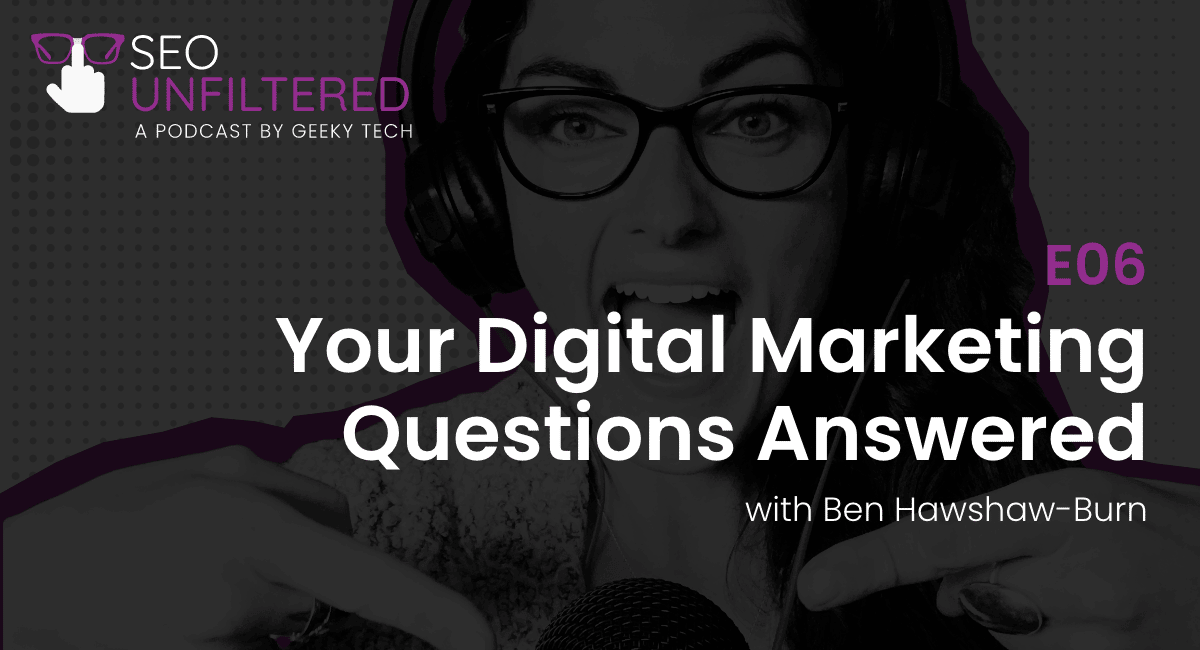
Show Notes
The Geeks are back for a new season, and to start us off, we’re going back to our roots to discuss off-page SEO, one of the three foundations of search engine optimisation.
In her own words, Genny tries to define ethical link-building strategies, but as soon as Jo Priest (Geeky Tech’s head of off-page SEO) gives his professional two cents, she realises that getting links is a lot of work, and the boundaries between what Google defines as “whitehat” and “blackhat” SEO is kind of hard to define.
Some key takeaways from this episode:
- Google doesn’t want anyone paying for links (but it’s almost impossible to avoid).
- Claiming your social profiles and getting your site on directory listings is the best place to start.
- You shouldn’t buy random links from random sites.
- Google’s algorithm is always changing to stay ahead of those who will exploit how it works.
- Sometimes a “quality” link is in the eye of the beholder.
Suggested Readings
Don’t forget to follow us on LinkedIn, Facebook, and Instagram @GeekyTechGeeks for all things SEO and advertising related. And, just a small favour: if you like what you heard today, be sure to subscribe, like, and follow us on Apple Podcasts, Spotify, Stitcher, or wherever you listen to your favourite shows. We’d also love it if you could leave a review; it helps other folks like you find our show.
Support your fellow marketing geeks! Follow us on Twitter, Facebook, and Instagram @GeekyTechGeeks for all things SEO and advertising related—and while you’re at it, why not subscribe, like, and follow us on Apple Podcasts, Spotify, Stitcher, or wherever you listen to your favourite shows.
Have any questions you want answered on the show? Email us at contact@geekytech.co.uk.
Thanks for listening 🤓

